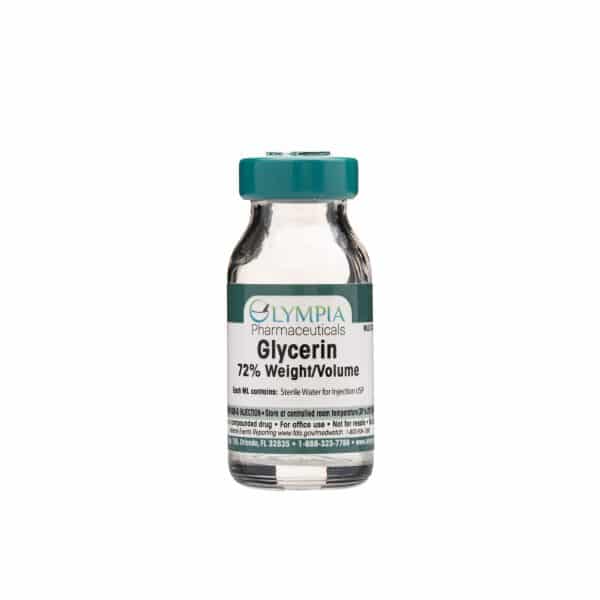Overview
Glycerin, also known as glycerol, is a colorless, odorless and viscous liquid that belongs to the alcohol family. It is derived from natural sources such as vegetable oils or synthesized through chemical processes. Glycerin has been widely used in various industries, including pharmaceuticals, cosmetics and food. It possesses hygroscopic properties, meaning it has the ability to absorb water from the surrounding environment.
Glycerin injections are commonly utilized as a sclerosant in medical procedures to facilitate the removal of small veins. When injected into small veins, highly-concentrated glycerin acts by irritating the inner lining of the blood vessels, causing them to constrict and seal off. Over time, the collapsed veins are gradually reabsorbed by the body’s natural processes and eventually disappear.
What Is Glycerin 72% Prescribed For?
Glycerin 72% is prescribed by medical professionals in sclerotherapy procedures for the purpose of collapsing small veins, ultimately leading to their reabsorption and disappearance. This treatment is typically recommended when dealing with veins that measure between 0.2 to 0.4 mm in diameter. The injection of glycerin 72% into these veins causes them to collapse, preventing the flow of blood and promoting their eventual absorption by surrounding tissues. As a result, the veins gradually fade away over time.
Benefits of Glycerin Injections
The concentration of glycerin injections used in sclerotherapy procedures is usually 72%. Glycerin injections have garnered popularity due to their efficacy in collapsing small veins with diameters ranging from 0.2 to 0.4 mm. Compared to other sclerosants, glycerin is often preferred for its lower incidence of side effects and favorable tolerability in many patients.
Dosage, Concentration, Route of Administration
Dosage: Seek advice from a licensed physician, medical director, or other healthcare provider
Concentration: 72%
Route of Administration: IM/IV/Sub-Q
Resources:
Precautions/Side Effects
While glycerin injections are generally well-tolerated, there are a few precautions and potential side effects to consider. Following the injection, some individuals may experience temporary irritation and redness at the injection site. These local effects are typically mild and subside over time without causing any significant complications.
While allergic reactions to glycerin injections are rare, they can still occur. Patients who have a known hypersensitivity to glycerin or any other ingredients in the injection should inform their healthcare provider before undergoing the procedure.
Storage
Store at controlled room temperature.
Ready to Learn More About Glycerin 72%? Contact Olympia Pharmacy Today!



